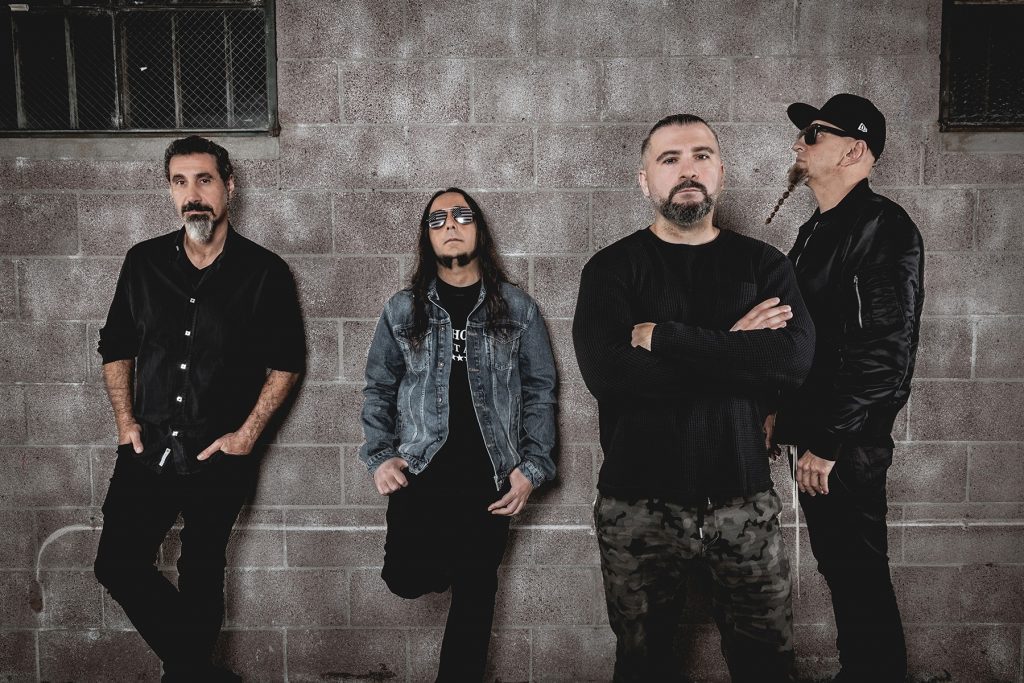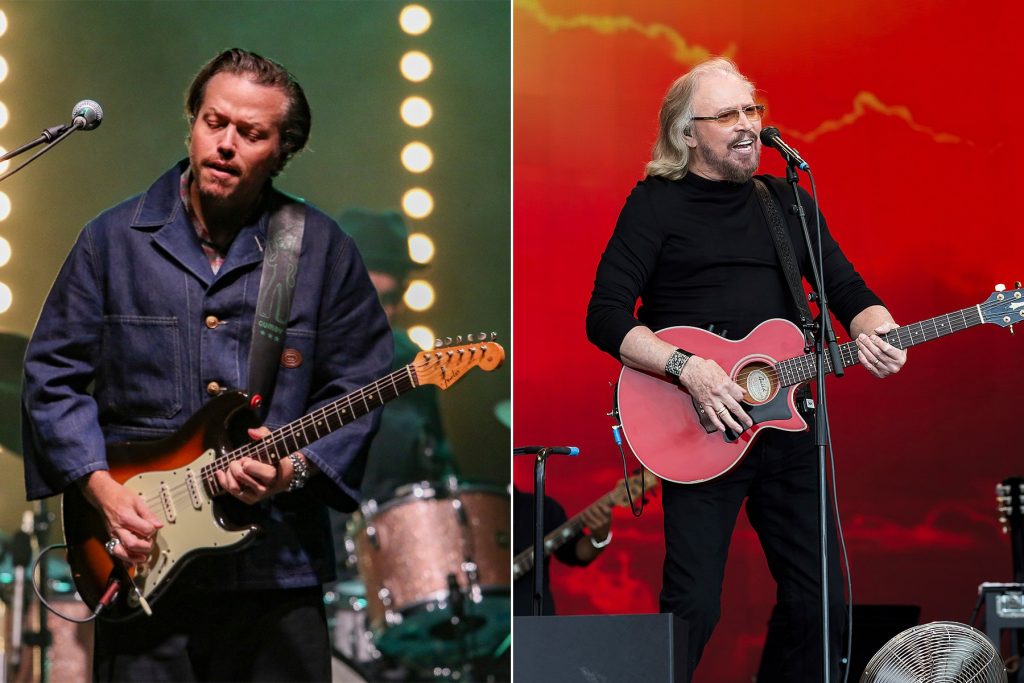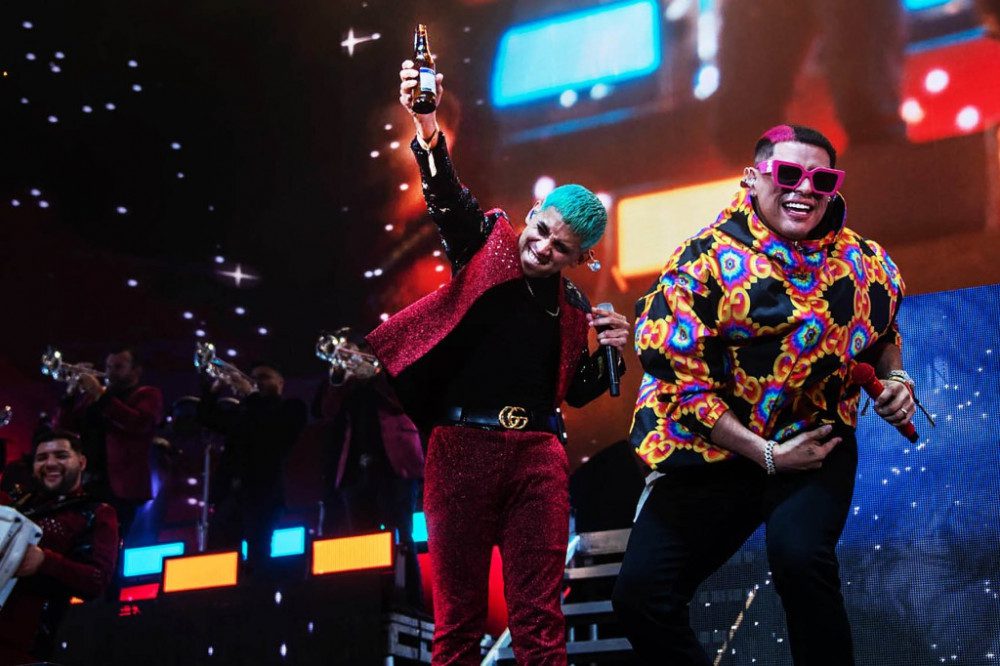
Hear System of a Down’s First New Music in 15 Years, ‘Protect the Land’ and ‘Genocidal Humanoidz’
It took a war for System of a Down to record new music. After seeing the country of Azerbaijan start a conflict with Armenia in September, the musicians, who are all of Armenian descent, rushed into the studio to record two new songs, “Protect the Land” and “Genocidal Humanoidz,” to draw attention to the crisis in their ancestral homeland.
The band will donate proceeds from the songs, which come out Friday, to aid Armenians, and it is soliciting fans to donate to the Armenia Fund, which provides humanitarian relief to the region. Both songs are available on the group’s Bandcamp page.
Fifteen years have passed since the Grammy-winning alt-metal group released their last record, Hypnotize. When it came out, it was an instant hit, the second of two System albums to debut at Number One in 2005. But despite their success, they have not been able to agree on a path forward ever since. Their singer, Serj Tankian, had asked for a more democratic songwriting process — guitarist Daron Malakian wrote nearly everything — but they couldn’t reach a meeting of the minds. They have since toured together and remained friends, but internally, the struggle for creative control has seemed insurmountable.
blogherads.adq.push(function () {
blogherads
.defineSlot( ‘medrec’, ‘gpt-dsk-tab-article-inbody1-uid0’ )
.setTargeting( ‘pos’, [“mid-article”,”mid”,”in-article1″,”mid-article1″] )
.setSubAdUnitPath(“music//article//inbody1”)
.addSize([[300,250],[620,350],[2,2],[3,3],[2,4],[4,2]])
;
});
The band decided to put its differences aside last month after war broke out in Nagorno-Karabakh, a mostly ethnic-Armenian region of Azerbaijan that Armenians call “Artsakh.” It covers about 1,700 square miles of mountainous terrain, and it has had a long, bloody history that has scarred the people who live there. A previous war between Armenia and Azerbaijan ended with a cease-fire and Armenians in control of the region in 1994. Azerbaijan initiated another war this past September after its president, Ilham Aliyev, took umbrage with Armenian prime minister Nikol Pashinyan’s claim this past spring that Nagorno-Karabakh was wholly Armenian. Russia, France, and the United States have each attempted to mediate cease-fires between Armenia and Azerbaijan, but none have stuck.
Armenia, a country of about 3 million, is well-outnumbered by Azerbaijan, which has 10 million citizens, a stronger military, and aid from Turkey, Armenia’s longtime foe since the 1915 Armenian Genocide, which was propagated by Ottoman Turks. The prime minister of Armenia, which has received support from Russia, suggested that Azerbaijan has recruited mercenaries from Syria, although the latter country denies it. The organization Human Rights Watch has claimed that Azerbaijan has used banned weapons and cluster munitions in its fight (it says Armenia used or supplied cluster munitions used in an attack as well), and the British newspaper, Morning Star, has reported on an Azerbaijani soldier who beheaded an Armenian soldier and taunted his family with it. The U.N. has warned that attacks on citizens in the area could be considered war crimes.
The band believes that Azerbaijan planned out the timing of the attack to coincide with news coverage focusing on the U.S. election and the response to Covid-19. And even though System don’t all share the same politics — Tankian has voiced support for Democrats, and drummer John Dolmayan (the singer’s brother-in-law) supports Trump — they decided to put those differences aside as well, since they believe the crisis in Nagorno-Karabakh transcends American politics.
“What I would like [Trump] to do is protect the interests of the United States but, at the same, time protect the values of the United States and what we stand for,” Dolmayan tells IndieLand. “There’s injustice happening. We can’t just enter into conflict for monetary reasons. I get that we have to think of the interest for the [U.S.] going forward, but we have to walk the walk and talk the talk. Don’t be a hypocrite.”
“This is gruesome shit that’s going on,” bassist Shavo Odadjian says. “There’s nothing humane about it. They’re not saying, ‘Oh, leave our lands. We’ll be so polite to help you leave.’ They’re massacring people and doing all sorts of cowardly, disgusting things. And that just touches all of us [in the band].”
blogherads.adq.push(function () {
blogherads
.defineSlot( ‘medrec’, ‘gpt-dsk-tab-article-inbody2-uid1’ )
.setTargeting( ‘pos’, [“mid-article2″,”mid”,”in-article2″,”mid-article”] )
.setSubAdUnitPath(“music//article//inbody2”)
.addSize([[300,250],[300,251],[620,350],[2,4],[4,2]])
;
});
“It’s totally a David and Goliath situation,” Malakian adds. “Armenia can’t do this by themselves.”
“I have been to Artsakh twice,” Tankian recalls. “It’s just beautiful countryside, and it’s just really sad seeing all of that destroyed right now and the people having to move. The people are just incredible there. They’re the old Armenians. They have been living on those lands since 500 B.C. They’re very strong and beautiful and funny. They don’t get scared, man. They’ve seen this before, but it’s really, really fucked up.”

System of a Down show their Armenian pride in 2020. Clockwise from top left: Daron Malakian, John Dolmayan, Shavo Odadjian, and Serj Tankian.
Armen Keleshian*
Dolmayan remembers watching the war unfold and feeling sick. “I had a lot of feelings of anger and powerlessness, and then I thought back to how my ancestors must have felt during the genocide,” he says. After years of disappointment with the state of System of a Down, he had come to terms with the fact that the group would never record together again. But the horrors he was seeing inspired him to pick up his phone at 10 o’clock at night on the first Sunday in October and reach out to his bandmates.
“I sent a text to the other three guys, and said, ‘Irrespective of your feelings for each other and the past, we have to put everything aside and get in the studio and create a song for our people to bring attention to the situation and galvanize the forces of good worldwide,’” he recalls. “And I got pretty positive responses.”
Odadjian was an easy yes. He had been watching news reports about the war and felt the same way. In fact, he was just about ready to send his own text when he got the drummer’s note.
Tankian decided that drawing attention to the war was worth letting his guard down. “I’m not doing this as an artist for myself or for System of a Down or for any of the guys in the band; we’re all doing this for our people,” he says. “So this is not a creative decision, this is not a business decision. This is a decision of activism, and that takes precedence over all other things for us.”
“If we don’t do this, there isn’t any other huge Armenian rock band out there that’s gonna do this,” Malakian says. “There aren’t that many big Armenian celebrities out there that are going to do this. It’s kind of a duty. We came together because our country needed us, not necessarily because we’re so amped to do a brand-new System of a Down song. Our people needed us to do this.”
blogherads.adq.push(function () {
blogherads
.defineSlot( ‘medrec’, ‘gpt-dsk-tab-inbodyX-uid2’ )
.setTargeting( ‘pos’, [“mid”,”mid-articleX”,”in-articleX”,”mid-article”] )
.setSubAdUnitPath(“music//article//inbodyX”)
.addSize([[300,250],[300,251],[3,3],[620,350]])
.setLazyLoadMultiplier(2)
;
});
Malakian sent his bandmates “Protect the Land,” a hard-charging anthem he had earmarked for the next album by his other group, Scars on Broadway, and the rest of System felt it spoke perfectly to how they felt. The track opens with a slow-churning guitar riff and Malakian and Tankian harmonizing lyrics that ask listeners what they would do if someone tried to push them from their homes. “Would you stay and take a stand?” they ask mournfully. “Would you stay with gun in hand? They protect the land.” To drive it home, when they repeat those questions later, Malakian runs his hands up his guitar neck, imitating the sound of bombs falling.
The guitarist wrote the song about a year and a half ago after he had penned another song about tensions around Artsakh called “Lives” for his 2018 LP, Dictator. “We used [‘Lives’] to raise money to have first-aid kits sent to Artsakh because I heard soldiers and civilians needed them,” he says. “So that’s how the topic for [‘Protect the Land’] came into my mind; the people and soldiers of Artsakh were in my thoughts.”
They cut the song within a week of Dolmayan’s initial text, and Odadjian immediately began work on the track’s video in private, filming different generations of Armenian descendants while telling them that he was making a documentary about the Armenian diaspora that spread across the globe after the genocide. “I brought in everyone from every age,” he says of the clip. “We have babies, my two sons, the high priest of L.A., doctors, cab drivers, and soldiers in the video. At the same time, we have people in Armenia in Artsakh filming on the frontlines of the war going on. So the message is, ‘I know we’re thousands of miles away, but we stand with our troops and we stand for this one common cause as Armenians.’” The clip features footage of soldiers on the frontlines, a well as shots of the band with projections of some of the footage Odadjian shot superimposed over their faces, similar to the band’s “Toxicity” clip.
The band’s manager thought “Protect the Land” captured the importance of the moment but urged them to record another, heavier tune to complement it. Three or four years ago, Malakian, Dolmayan, and Odadjian convened for a jam session that produced several songs, but they abandoned them when Tankian wouldn’t commit to an album. One of the standouts was the Malakian-penned “Genocidal Humanoidz,” a fast, punky number about fighting back against the devil. This time, all four members agreed to record the song. Malakian sings, “Persecution ends now,” midway through and cocks his guitar like a gun before the band whips through a whirlwind of black-metal riffs, and Tankian asks, “Guess who’s coming over to dinner? The genocidal humanooooiids.” It’s a whole other mood that captures the spasmodic unpredictability of the band’s best music.
blogherads.adq.push(function () {
blogherads
.defineSlot( ‘medrec’, ‘gpt-dsk-tab-inbodyX-uid3’ )
.setTargeting( ‘pos’, [“mid”,”mid-articleX”,”in-articleX”,”mid-article”] )
.setSubAdUnitPath(“music//article//inbodyX”)
.addSize([[300,250],[300,251],[3,3],[620,350]])
.setLazyLoadMultiplier(2)
;
});
“The song really matched up well [with ‘Protect the Land’],” Malakian says. “The original lyrics are pretty close to what we recorded. The original line [in ‘Genocidal Humanoidz’] was, ‘Terrorists are coming, and they’re never going to stop,’ so to make it fit, I changed it to, ‘Terrorists we’re fighting, and we’re never gonna stop.’ And the word ‘humanoids’ came to me from the late wrestling manager Bobby ‘The Brain’ Heenan. He used to call the audience a bunch of humanoids, like a bunch of idiots. I had to change very little with the wording to make it work with the message we’re trying to send out now.”

Even though they hadn’t all been in a studio together in more than a decade, tracking the songs went surprisingly smoothly and quickly. Within a few days of deciding to record, each musician started arranging his own part — Tankian developed his harmonies for “Protect the Land” while still in New Zealand, where he lives part-time — and the singer flew to Los Angeles on October 11th to join everyone in the studio. They finished tracking the cuts that week.
“This was something that was bigger than any issue we’ve ever had with System,” Odadjian says. “We had to put everything away and say, ‘We’ve got to get together because, when we speak after 15 years, people will listen.’ People will be like, ‘Whoa, these guys came back? For what?’”
Each of the band members expressed fears that Azerbaijanis, who are predominantly Muslim, view the war against Armenia, a Christian nation, as a holy war and that the conflict could escalate into another genocide. By bringing attention to the war, they hope their fans will contact their representatives in government and ask them to intervene. “Make your voice heard and talk about this injustice and say you’d like to see Turkey and Azerbaijan sanctioned,” Tankian says. “You’d like to see the perpetrators punished. It doesn’t take money or military to do that, it just takes economic pressure on those countries to back off because they’re the aggressors.”
blogherads.adq.push(function () {
blogherads
.defineSlot( ‘medrec’, ‘gpt-dsk-tab-inbodyX-uid4’ )
.setTargeting( ‘pos’, [“mid”,”mid-articleX”,”in-articleX”,”mid-article”] )
.setSubAdUnitPath(“music//article//inbodyX”)
.addSize([[300,250],[300,251],[3,3],[620,350]])
.setLazyLoadMultiplier(2)
;
});
System of a Down also hope to aid humanitarian efforts in Armenia and Nagorno-Karabakh. “We’ve been doing this as a global diaspora and Armenian community, but we need the help because our adversaries have oil and natural gas and they’ve been spending billions of dollars on their military,” the singer says. “We need financial help to take care of our people that are in bomb shelters in Artsakh and families whose children are not in school. And there’s an incredible spike [in Covid-19 cases] in Armenia, which is very dangerous and scary. So it’s a really horrible humanitarian catastrophe that needs to be addressed.”
Although Dolmayan is excited that he got his band back together for the cause, he says fans should not expect more music or a new album. “If it was up to me, we’d have a new album every three years,” he says. “But things aren’t up to me. I’m at the mercy of my team, and although I fought for it for many years with band members, I’ve accepted that it is what it is. We do have five albums and [now] two songs. We’ve accomplished a lot in our careers. If it ends at that, so be it.”
Tankian, who has shelved a solo EP, Elasticity, that he had planned to release this fall, has no plans to work on new music with System or anyone else until the conflict is resolved. “I can’t think of anything [else] right now — not my own music, not System’s music,” he says. “I’m focused on what’s going on with the war and praying for a cease-fire so there can be negotiations. I’m just focused on this because it’s a life-and-death situation.”
But some of his bandmates are more hopeful that System will resume at some point in the future. “I’m proud that we did this,” Odadjian says. “I wish we could get in and do more. Maybe this could lead to that, maybe it can’t. I’ve always been optimistic, though.”
blogherads.adq.push(function () {
blogherads
.defineSlot( ‘medrec’, ‘gpt-dsk-tab-inbodyX-uid5’ )
.setTargeting( ‘pos’, [“mid”,”mid-articleX”,”in-articleX”,”mid-article”] )
.setSubAdUnitPath(“music//article//inbodyX”)
.addSize([[300,250],[300,251],[3,3],[620,350]])
.setLazyLoadMultiplier(2)
;
});
“I never say never,” Malakian says. “I didn’t expect this. I was ready to put out my next Scars record. This kind of happened out of the blue, so who knows. If we don’t record again, then I’ll just keep doing what I do and everyone else will keep doing what they do. But it was nice to do this.” He’s mostly happy the band members could move past their issues long enough for the good of their ancestral homeland. “I’m not a soldier, but I feel like I’m a part of this,” he says. “The way I’m going to contribute is through my songs.”



